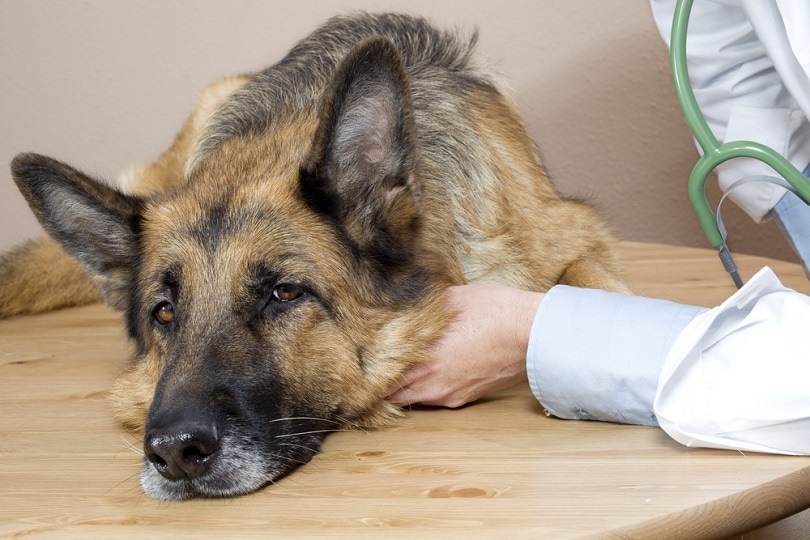
A cough is a sudden, forceful expulsion of air from the lungs. It is a protective reflex that helps keep the lungs and airways free of irritants such as foreign particles, microbes, and excessive secretions. An occasional cough is normal and may be nothing more than an attempt by a dog to clear its airways after inhaling an irritant. However, a persistent cough or a cough that is accompanied by other signs of illness may indicate a more serious underlying disease.
Let’s discuss some of the most common reasons that would cause a dog to cough.
The 6 Reasons Dogs Cough
1. Heart Disease
Congestive heart failure is a term that describes the inability of the heart to pump blood throughout the body adequately. Congestive heart failure is classified as either right-sided or left-sided, and signs vary accordingly. In right-sided heart failure, fluid accumulates in the abdomen, giving the appearance of a swollen belly. In left-sided heart failure, fluid accumulates in the lungs, causing coughing and difficulty breathing. The heart also enlarges and pushes against the trachea, causing irritation and coughing. While there are many causes of congestive heart failure in dogs, the two most common causes are mitral valve insufficiency, typically seen in small-breed dogs, and dilated cardiomyopathy, typically seen in large-breed dogs.
In addition to a cough that tends to be worse at night, dogs with congestive heart failure tire more easily, have an increased respiratory rate and develop muscle wasting. Dogs with congestive heart failure may also have pale or blue-tinged gums and have fainting spells or collapse.
Usually, the earliest sign of heart disease is a murmur, which your veterinarian may detect during a routine checkup. However, not all dogs with murmurs will develop congestive heart failure.
2. Canine Infectious Respiratory Disease Complex (CIRDC)
This term Canine Infectious Respiratory Disease Complex (CIRD) has recently replaced the term kennel cough or infectious tracheobronchitis.
CIRDC is a multifactorial disease that is caused by several respiratory organisms. The organisms implicated in this disease complex include Bordetella, Streptococcus zooepidemicus, Mycoplasma, parainfluenza, adenovirus Type 2, canine influenza, distemper, respiratory coronavirus, and pneumovirus.
CIRDC is highly contagious and causes acute or chronic inflammation of the trachea and bronchial airways. It is spread rapidly between susceptible dogs in close confinement, such as dogs at boarding kennels, doggy daycares, rescue facilities, and dog parks. Stress, extremes in temperature and humidity, and poor ventilation can contribute to the development of the disease.
Signs of CIRDC include dry, harsh coughing fits, retching, and gagging. The development of more severe signs such as a fever, nasal discharge, lethargy, inappetence, and a wet cough, could mean that a dog has developed pneumonia.

3. Heartworm Disease
Heartworm disease is a potentially fatal disease found in some parts of the world, caused by the blood-borne parasite Dirofilaria immitis. The life cycle of this parasite begins when a female mosquito gets infected by feeding on a dog infected with heartworm. The parasite matures to the larval form inside the mosquito and then moves to her mouthparts. When a mosquito feeds on another dog, the larvae enter the dog’s body and infect the dog. The larvae move into the dog’s bloodstream and migrate to the heart and surrounding blood vessels, where they mature and start reproducing.
Adult heartworms cause disease by clogging the heart and major blood vessels. The most common sign of heartworm disease is a soft, dry cough. Other signs of the disease include difficulty breathing and exercise intolerance. In severe cases, an infected dog will struggle to breathe, collapse, and show signs of right-sided heart failure, such as a swollen abdomen due to fluid accumulation.
4. Tracheal Collapse
The trachea or windpipe is a flexible tube with 35 to 45 c-shaped rings. These rings are made of cartilage. The cartilage keeps the trachea open to allow air to flow in and out. Tracheal collapse is a progressive condition in dogs, where the cartilage rings of the trachea weaken and collapse, obstructing oxygen flow and causing breathing difficulties. Signs of tracheal collapse include a dry, harsh, “honking” cough and breathing difficulties. Coughing episodes may be precipitated by pressure on the throat by a collar, excitement, drinking, exercise, and excessively high or low temperatures. In severe cases, a dog with tracheal collapse may go into respiratory distress due to a lack of oxygen.
The cause of this condition is unknown, but it has been hypothesized that a combination of environmental and genetic factors causes tracheal collapse. This condition is common in middle-aged, small-breed dogs such as Yorkshire Terriers, Toy Poodles, Pomeranians, Chihuahuas, and Pugs. Being overweight and living in a household with smokers may worsen the condition in affected dogs.

5. Airway Foreign Bodies
Foreign materials such as grass, seeds, and sticks may be accidentally inhaled during exercise. Inhaled foreign bodies may migrate through the airways, from the nasal passages to the trachea and bronchi. This condition is usually seen during the summer months.
In some cases, foreign bodies lodged in the trachea and bronchial tree can cause a severe inflammatory reaction, introduce bacteria and fungi, and incite a foreign body response, causing infections and abscesses. The most common signs of airway foreign bodies are coughing and gagging as a dog attempts to expel the foreign body. In addition to coughing, dogs with secondary infections may show signs of fever, respiratory distress, decreased appetite, and lethargy.
6. Lung Tumors
Tumors arise from the abnormal growth of cells and are caused by a complex interplay of genetic and environmental risk factors. Tumors can be classified as either “benign” or “malignant”. Benign tumors grow slowly and do not spread, while malignant tumors grow rapidly, invade surrounding healthy tissue, and spread to other parts of the body. Lung tumors are classified as either “primary” or “metastatic”. Primary lung tumors originate in the lungs of dogs, while metastatic tumors originate in other parts of the body and metastasize or spread to the lungs.
Primary lung tumors are rare in dogs. On average, primary lung tumors are diagnosed between the ages of 10 and 12 years, and 80% of these tumors are malignant and have a high chance of spreading to other parts of the body. The most common primary lung tumor of the dog is pulmonary carcinoma. The most common sign of primary lung tumors is a non-productive cough. This means the cough is dry and does not bring up mucus or secretions. Other signs of primary lung tumors are fever, lethargy, exercise intolerance, weight loss, and a decrease in appetite.
While primary lung tumors are rare in dogs, some tumors that occur elsewhere in the body have a high likelihood of spreading to the lungs. These are known as metastatic tumors. Mammary gland tumors, bone tumors, thyroid tumors, and melanomas of the mouth and toes all have the potential to metastasize to the lungs. The signs of metastatic tumors are similar to those of primary lung cancer.
When to Act
An occasional cough may be nothing more than a dog’s protective reflex to help clear the airways of inhaled irritants such as dust, smoke, or food particles. If a dog’s cough persists longer than a day or two, increases in frequency or severity, or is accompanied by other signs of illness, such as fever, loss of appetite, breathing difficulties, or lethargy, it is important to act and get your dog checked by a veterinarian. These signs could indicate a potentially serious underlying illness that requires veterinary treatment.
See Also:
- Why Is My Dog Coughing Like Something Is Stuck in His Throat? (Vet Answer)
- Are Cough Drops Safe for Dogs?
Featured Image Credit: 5075933, Pixabay








